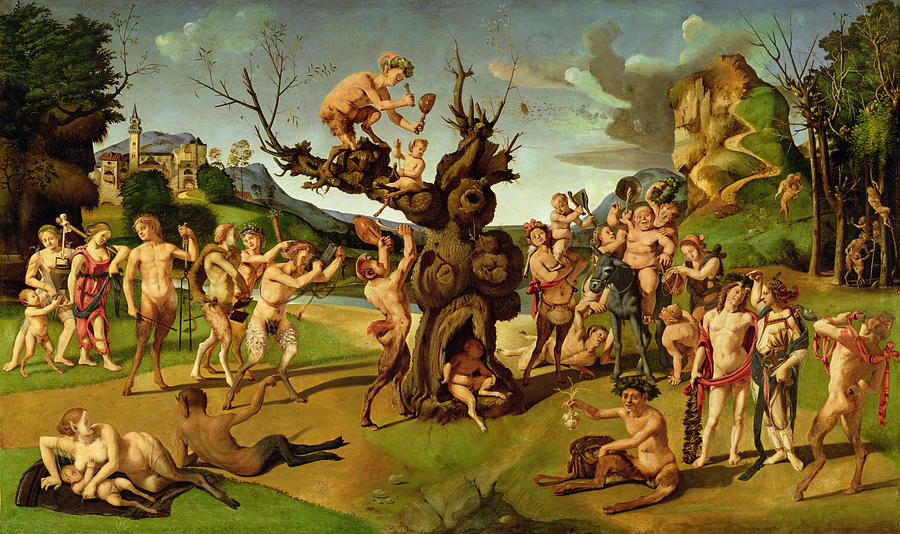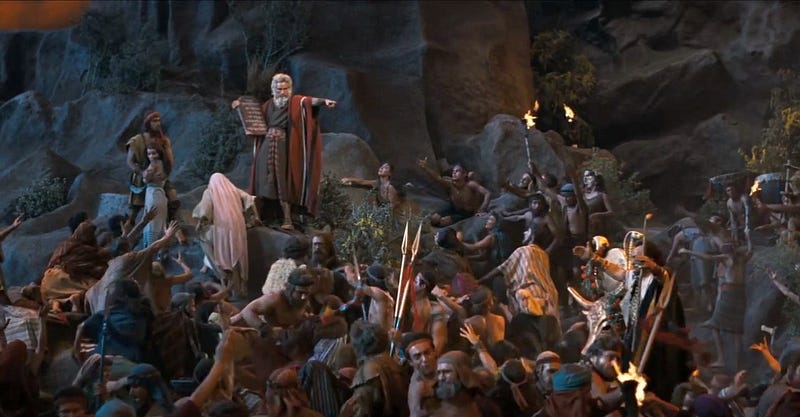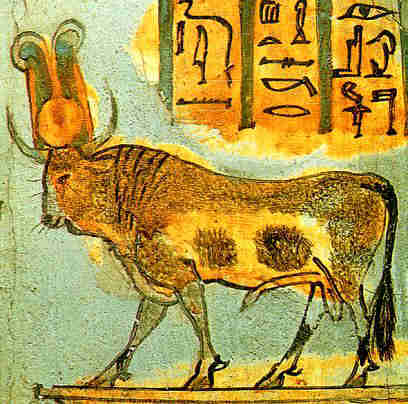
Many years later when Moses returned home 1 day from "communicating with his God" he found his children dancing before the despised Bull God Apis, the animal which carries the living spirit of Osiris. Moses heard the "heathen sounds" (timbrel'd anthems dark, boogie, jazz, down-home music, funk, gutbucket) he hadn't heard since the old days in Egypt.
-- Mumbo Jumbo, Ishmael Reed
A forgotten transmission of the Mysteries (soon to be stomped out here in the Sinai and nearly fully eradicated centuries later in Egypt herself and throughout the ancient world) caravanned across the Sahara to the Atlantic shore, finding a home as the beating heart of religions later identified as Yoruba and Vodun. Centuries later still, the Orishas and their rites traversed the ocean; stowaways of the imagination, the secret hope of the newly enslaved. The New World, paradoxically, became the setting of the oldest rites unchained.
But way back in Sinai, the repression is just beginning. A people has been set free only to be weighed down again by a law carved in stone. The golden bull has been cast down. All the shaking and shimmying and shouting has been silenced. Everything furry and feathery and fluid has been made marble-smooth and cold. Categories and definitions and commandments have replaced ecstatic customs and ethics which reflected the shifting courses of the wild.
Spirits, eight million at least, were shoehorned into the anthropomorphized molds of a transcendent dozen, and finally fused into a single Lord of the Sky. Jes Grew, for a long era in the West, just shrank. Dancers became soldiers, workers, fodder.

At no point, except by the invention of writing, has language ever been the monopoly of a dominant minority, despite class differentiations of usage; while the medium itself is so complex and so subtle that no centralized system of control was ever, even after the invention of writing, completely effective.
-- The Myth of the Machine, Lewis Mumford
Yet despite the abhorrent and unearthly rule of the Megamachine, the greatest product of the human mind -- language itself -- defies complete control. The spoken word is too subtle and nuanced, too quickly evolving and idiosyncratic, to remain the fixed possession of a dominant class. "Educated" elites might be conned or coddled into accepting the castrated language of the state, but the speech of the common people will always be more akin to the chirping of birds and the rustling of trees.
Meaning is not a thing that can be corralled and stabled. Even Newspeak would evolve its own subtext or slang of subversion. And always this playful upset of words bubbles up from the bottom, from the base of the pyramid that stretches out beyond the horizon, radiating its sublime confusion to the very apex. It is within meaning that the spirits still boogie.The spoken word will inevitably dispel the Spell.
But even written language, the once exclusive monopoly of the priests of Empire and used initially for the inventories of commerce and bureaucracy, becomes eventual prey to Poetry. The rhythms and shades, puns and puzzles, of the spoken word begin to infect it as well. Its precision starts to blur. Its ass begins to twitch in spite of itself. Literature, first in the form of poetry and song, is the revenge of the oral tradition of free humanity over the dictators and scribes of the word bound by symbol.

It is the first attempt to distinguish different things, which at this stage are still mutable -- forces or energies that may be formulated and shaped in any way we (as the whole system) please -- and as such is the imaginative cultivation of the vision as a creative reaching out to these formulated energies -- popularly believed to be "gods" who are somehow "out there" and turned into an eternal principle by subsequent speculation, which is at the root of all forms of theism. In the cultivation of the vision these energies are recognized as "projections" of one's own mind...
-- The Creative Vision, Herbert Guenther

For in truth all things are mutable, unsteady, lacking in definable essence. All attempts to convince people otherwise are precisely cons -- priestly projections of illusion that pretend to bind forces, energies, words, spirits into the unchanging forms of gods or demons or laws.
Beyond these counterfeit forms, however, flow the juices of the unfathomable. Every potential swirls and circulates here. All roots are tangled together at this point, feeding one another nourishment, lore and the power to manifest. There are really no Archetypes. No types or classes or principles at all. Instead singular events shine and resound for an instant; some mighty and some without apparent effect, but all absolutely unique facets of the churning void.
As a result of these reciprocal relationships with Things, which he would habitually control through his thought processes (but we all of us can, and it is by no means certain there is a difference, even in time, between thought, volition and act, cf. the Holy Trinity), he no longer made any distinction at all between his thoughts and actions nor between his dreaming and his waking; and perfecting Leibniz' definition, that perception is a hallucination which is true...
-- Days and Nights, Alfred Jarry

Thought, will and action are but one movement, a trinity in unity. When we perceive we incarnate the Spirit into formless matter. This happens within dreaming or within waking life, under the Moon or under the Sun. All existence is resolved pataphysically, and the only solutions are truly imaginary. Relations with Things are reciprocal at this juncture because it is no longer clear where I stop and Thing begins. And Thing One and Thing Two...
Who is the hallucination of what? The cosmos is a simulation of who? For a perceiver dwelling on the surface, the infinite sphere and the infinite plane would be identical. And the real story (snicker snicker) must be both and neither.
and indeed your words are esoteric
and difficult enough sometimes,
but exhausted by the whirlwind,
-- Hermetic Definitions, H.D.

It is the whirlwind that is key here. In the spiral pattern of this breath, this spirit, does language -- again, our fundamental technological extension -- emerge and find its motion. These spiraling breaths, carrying all signs and signals, interlace each Self and each Other together. And the message is difficult and esoteric, teaches the clear-sighted imagiste, but there is something vast and roaring yet simple and straightforward just behind it. The whirlwind. The heathen sounds.
Ahab is Conjur Man. He invokes his own evil world. He himself uses black magic to achieve his vengeful ends. With the very words "in nomine diaboli" he believes he utters a Spell and performs a Rite of such magic.
-- Call Me Ishmael, Charles Olson

With the coming of Ahab, Moses returns. A desert of salt water replaces the desert of sand, though both are equally shifting and treacherous. Moses tries to pin down the voice of God into rock. Ahab tries to pin down God as Leviathan with actual harpoons. One loves and obeys his deity and prey, the other hates and rebels against its every command. Maybe Ahab is the more honest hunter.
It makes sense, thinks the poet Olson, that Ahab invokes the Devil during his mad quest. Satan also disobeys out of love and as a result he separates himself from God. But -- one more time around -- who is this "God"? The White Whale? The Gold Bull? The Crucified Man? Isn't he/she/it just the endless flux and storm of sand and water and words?
How could anyone, from such a perspective, ever become separated from this? Moses' obedience, Lucifer's rebellion, Ahab's revenge, Christ's forgiveness: all shams, bad mojo, the sleight of hand of the conjur man. Ahab's goetia is Moses' theurgia. Caught in the harpoon ropes, our savior-captain crucifies himself on the side of the albino Demiurge that he had no chance (or real expectation?) of really slaying.
To the thoughtful mind all history is sacred, and the whole world is a holy land in which man walks as in a garden planted by the hand of his Creator. Mystery encompasses his steps on every side; a divine voice breathes in the rustling of the trees at eventide and in the songs of birds at sunrise; he reads the nightly scripture of the stars, and his heart accompanies the solemn chorus of the sea.
-- The Divine Mystery, Allen Upward

And for a few, in fleeting moments of intensity, the Fall never really took place. And we realize instantly that they are correct. The fall from what to what? Satan was no rebel, Eve/Lilith was no temptress, Adam was no dupe.
Or perhaps they played their assigned roles so well that almost no-one noticed they were acting? Even today full suspension of belief is only possible if one is arrogant enough to try to step out of the story. And this is only self-delusion, gazing at one's reflection in a glass sparkly.
But if we accept the accounts of these revelations to the few, what emerges is the most dangerous heresy imaginable. It means that we would, all of us at every second, continue to dwell in Paradise. It would mean that all perception is blessed, that all things possess meaning, that all separations are illusory, that all history is sacred.
The deadening technology we hate, the behemoth institutions, the despised mAgamachine and its poison & oppression & ignorance & weapons of war, are even still the crystallized derivatives of language through which the divine voice also breathes. This voice speaks, though, with summer and winter, with feast and famine, through wide and loving eyes and through the hollow sockets of a grinning skull.
The universe is dead for us, and how is it to come to life again? "Knowledge" has killed the sun, making it a ball of gas, with spots; "knowledge" has killed the moon, it is a dead little earth pitted with extinct craters as with small-pox; the machine has killed the earth for us, making it a surface, more or less bumpy, that you travel over. How, out of all this, are we to get back to the grand orbs of the soul's heavens, that fill us with unspeakable joy? How are we to get back Apollo, and Attis, Demeter, Persephone, and the halls of Dis? How even see the star Hesperus, or Betelgeuse.
-- A Propos of "Lady Chatterley's Lover", D.H. Lawrence

Lawrence is describing the present winter of our imagination. Where are the gods? We have killed them! But not really. We have only killed them for ourselves. Nothing beyond this is possible. They are waiting, some more patiently then others, for us to acknowledge their "return". Yet even these ancient ones, we remember, are constructions and projections of mindstuff. Apollo and Attis and Apis and Ahab are our designations for massive convergences of energy, vast eddies in the whirlwind, standing waves mistaken for eternal archetypes.
Behind and beyond and within them are the boogie-woogying sprites of syntax, pun funksters, pointy-headed nixies of the second death. The whole heaving and hairy madhouse of Faery lies just at the back of their eyes. Tentacles, creepers, claws, fangs, plumage, blossoms, spazzing, spinning, melting, congealing at all speeds and all possible and impossible patterns of thought and volition. How do we get back to this? How is it that we came to believe that we ever left?
Imagination is Creative Power. Medicine uses imagination fixed. Phantasy is not imagination, but the frontier of folly. He who is born in imagination discovers the latent forces of Nature. Imagination exists in the perfect spirit, while phantasy exists in the body without the perfect spirit. Because Man does not imagine perfectly at all times, arts and sciences are uncertain, though, in fact they are certain and obtained by means of imagination, can give true results. Imagination takes precedence over all. Resolute imagination can accomplish all things.
-- Paracelsus, quoted in Hidden Riches, Desiree Hirst

The words differ from poet to poet, but let's not be unintentionally confused. The good doctor here dislikes "phantasy"while Tolkien affirms it. Coleridge writes of "primary and secondary imagination," Jung of "active imagination," Corbin of "creative imagination." Blake, maybe most perceptively, affirmed "Jesus the Imagination."
It's easy to get tied up in hairsplitting, but the gist of these terms is clear and can almost be felt as a physical force. The forces of nature, latent or not, are identical to what we know to be the imagination. The perfect spirit, in a less Platonic way than Paracelsus may have intended, is ubiquitous and perpetual. It is revealed by the senses and in words and in actions. It is at the wellspring and at the taproot, the virtual and the potential, and this is the where and the why and the how of the accomplishment of all things.
The arts, the sciences, medicine, religion all burst through this door. Nothing is dead if death is to mean an icy impossibility in which all transformation ceases. The imagination returns any object, tangible or not, to its elements and elementals and then in fusion creates anew.
Sub-creation reflects creation, the secondary imitates the primary, but every level is in fact enfolded upon itself. Basic to all is the very stuff of creation, the living plasticine of the gods and demons which they know also shapes their own existence. Absolute Matter and absolute Spirit meet at this point beyond the understanding of both mortals and immortals.
Love is encompassed in my Lady's eyes
Whence she ennobles all she looks upon.
Where e'er she walks, the gaze of everyone
She draws; in him she greets, such tremors rise,
All pale, he turns his face away, and sighs,
Reflecting on his failings, one by one.
-- La Vita Nuova, Dante
And on the one path set out for us in tradition, the straight path of descent and ascent, the only reliable guide is Love. Dante's lifetime quest was to reconnect with this pathfinder. In our journey up through the three realms and the seven spheres (all of which are really present at present), relying on the imagination as imagination is not sufficient if this path is chosen.
The imagination, as in Empedocles, contains both Love and Strife. All extremes are equally accessible. In this it is easy to become overwhelmed and lost. Love, true love that causes tremors and reflection upon failings, charts out a forward path. We cultivate our own projections and perceptions and love is the highest metaphor that we can choose.
The Paradiso concludes with the affirmation that love moves the sun and other stars. Strife is forever present, but love can be the only reason for creation. The desire for new forms of the old is a desire stemming from love. We meet her gaze and we imagine an end of this dead world.
,+facing+p.+113..jpg)